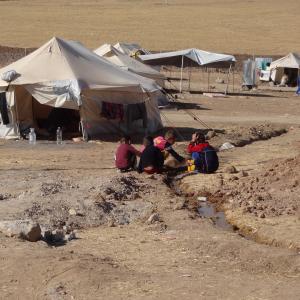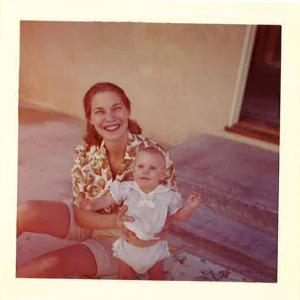
Cynthia Martens is currently the senior director of circulation and production and has been on staff at Sojourners since 1995. Cindy moved to the Washington area in 1975 and considers D.C. her home. She attended Northern Virginia Community College and George Mason University, studying design and business administration.
Cindy is a co-pastor of Festival Church, a small, ecumenical faith community that was birthed out of Church of the Saviour, and part of confederation of churches that have created hundreds of local missions, mainly in the Adams Morgan neighborhood.
Her interests include travel, music, theater, reading (biographies and mysteries), cooking, crosswords, and of course increasing the readership of Sojourners magazine.
Posts By This Author
'God Always Provides'
A priest in Jordan opens his church's doors to Iraqis fleeing ISIS.
REV. KHALIL JAAR is a warm, passionate, and energetic man—and he needs to be. As the spiritual leader and “go to” guy for the 150 Iraqi Christian refugees living in his church in Amman, Jordan, he needs all the energy he can get.
When I met with Father Jaar at St. Mary, Mother of the Church congregation in Amman, it quickly became obvious how much he loves the refugees who now call this church home. Jaar, himself a refugee, knows something about the trials and tribulations of being forced to leave your home. He is the son of Palestinian refugees of Honduran descent. (His birth name is Carlos and he took the name Khalil when he became a Catholic priest.) He also knows something about the terror of war. Shortly after the 2003 U.S. invasion of Iraq, he was abducted in Baghdad where he was serving, and “only by the grace of God was I freed,” he says.
Jaar is especially dedicated to the education of the Iraqi children forced to leave everything they knew, including their schools. In his overcrowded office, full of stacks of papers and files, Jaar pulls out a large binder. This is his personal reference book, with a page for each child in his care. It includes a photo, a short history of their family and background, their education to date, and also notes about their extracurricular activities and likes, such as soccer and music. It is important to know as much as possible about each child, he says, and make sure that they continue their education.
Gratitude with Hope
I'm grateful for the warm, safe shelter of my home when there are 610,042 experiencing homelessness on any given night in the U.S.
I’m grateful for more than enough to eat when there are 805 million people in the world do not have enough food to lead a healthy active live.
I’m grateful that I have clean drinking water when over 3.4 million people die each year from water, sanitation, and hygiene-related causes.
I’m grateful that I have good health when so many people do not have access to decent medical care, like the 5,459 people who have died from Ebola this year, and the millions more who die each year from preventable diseases.
I’m grateful I have clothing to wear when in the poorest of places, the lack of proper clothing costs lives, and hundreds of millions still live in conditions of material deprivation.
I’m grateful for my freedom when the U.S. had 1.57 million inmates behind bars, the highest percentage of a population of any developed country in the world.
I’m grateful for my citizenship when there are over 11 undocumented immigrants in the U.S. living in the shadow of constant fear.
But I’m especially grateful for the people I know, and the ones I don’t, that are working for justice and peace; a world where all our brothers and sisters have the basic necessities of shelter, food, clean water, decent medical care, and warm clothing. A world where every human being’s dignity is respected and valued. A world Jesus called the Kingdom of Heaven.
Reconciling the Faiths: An Interview with Fr. Nabil Haddad
Fr. Nabil Haddad is a passionate and energetic man. As a Melkite Catholic priest and dean of Old Cathedral in Amman, Jordan, he is especially passionate about fostering peace and reconciliation between Christians and Muslims. This work keeps him very busy, as he travels often to bring his message of peace as far and wide as possible.
The day before we met, Fr. Nabil announced at a press conference a new initiative called Karama. Karama is the Arabic word for dignity. He stressed the importance of coexistence between the Abrahamic faiths and how this can be achieved through education focusing on human dignity and by talking about citizenship. Fr. Nabil said this approach is very successful in reaching the hearts and minds of the Muslim community.
“Do not make the religion of Islam the problem,” he said. “Instead use our vibrant witness – that is what is lacking in other societies.”
Running from ISIS
Six weeks after ISIS overtook their village outside of Mosul, Iraq, Sief and Jacob Jebrita said they received an official cease and desist letter from the terrorist group saying their work was forbidden under Islamic law. The two brothers, partners in a small photography and videography business, lost their sole source of income. But that was just the beginning.
Sief and Jacob shared their story while sitting in St. Mary, Mother of the Church in Amman, Jordan, with a delegation of religious media. The church, led by Fr. Khalil Jaar, has become home to more than 150 Iraqi Christian refugees who have fled their homes while ISIS continues to push through the region.
Because of their Christian faith, Sief, Jacob, and their families were targeted by ISIS. They told me of a soldier ripping an earring out of a girl’s ear, slicing it open because it was not acceptable for her to wear jewelry. As ISIS militants forced people out of their homes, they would not allow them to bring anything with them at all except the clothes on their backs. They told me the story of one mother walking with her little boy who was forced to leave behind his bottle of milk after a soldier knocked it to the ground and shouted at them. As the situation worsened, they said they saw Yazidi men killed for refusing to accept Islam, and Yazidi woman sold into slavery in Mosul – $500 for younger women and $100 to $300 for older women.
Life, Death, and Beyond
I’ve been thinking about what it means to be chosen, and conversely how we choose to be chosen. I’ve also been thinking about life, death, choices, and what happens to us after our earthly body dies. Do we remember who we are here? Do we remember our friends, lovers, enemies, acquaintances? Do we remember events, important moments, unimportant moments, or forgotten moments? I believe we do. The problem is that all we know and have experienced about the Divine is limited by our own thoughts and words.
Reflections on an Eco-Justice Anacostia River Tour (PHOTOS)
On Saturday, Sojourners sent a group of staff members sailing down the Anacostia River.
But this was no pleasure trip.
Dottie Yunger, from the Anacostia Watershed Society, teamed up with Sojourners’ Creation Care campaign to teach some of our staff and a few other members of the local community about the state of the Anacostia river, how we as people of faith can be better stewards of our God-given resources, and how we can help create a healthier system where all creatures (both human and non-human) can survive and flourish.
Here are a few reflections from the trip.
Mother's Day: A Legacy of Wisdom and Strength
Sharing stories of my own mother and the ways she taught and encouraged me feels like the best way to honor her on Mother's Day. To this day when I am thinking of expressing an uncharitable thought I can hear her voice “If you don't have anything nice to say, don't say anything.”
Although this may sound like a cliché, it is a teaching that I am relearning once again in a class called “Wisdom of the Desert” and finding that my mother's sensibilities had many similarities to that of the early Christian Desert Fathers and Mothers. Gratitude and hospitality, two huge teachings of the desert monks, were also lessons I learned from my mother.

The Comfort of Strangers
"Death sucks." Five years ago this was the opening of a eulogy by a minister for a mutual friend who died tragically.
Between Dorothy and God
The attempt to capture Dorothy Day on screen
"There was never yet an uninteresting life," wrote Mark Twain. This statement could not be more true about Dorothy Day, co-founder of the Catholic Worker and lifelong advocate for the poor.
Entertaining Angels, the soon-to-be-released cinematic portrayal of her life, focuses on the 20-year span between 1917 and 1937. Dorothy is introduced as an ardent socialist and suffragette. She's young and idealistic, while smoking cigarettes and talking tough.
Dorothy's life progresses from protesting for women's rights at a demonstration to arguing against social injustices at the newsroom of the The Call, the socialist newspaper where she works. She hangs out at Hell Hole, a smoky Bohemian saloon, bantering with bawdy friends and colleagues, including playwright Eugene O'Neill. And an ill-fated love affair with Lionel Moise ends in a heart-wrenching abortion and depression.
Then Dorothy turns to a simpler life, living in a small beach house on Staten Island. This healing period includes a common-law marriage to biologist Forster Batterham, and the birth of their daughter, Tamar. Interspersed throughout this time is a growing attraction to, and conflict with, the Catholic Church. While living on Staten Island, she meets Sister Aloysius, a dedicated disciple of Christ who ministers to the poor and needy. The relationship between these two develops as each recognizes the intelligent, compassionate, and street-smart woman in the other.



